Note. We called our mother ‘Jhaiji’. This term was, perhaps, derived from ‘Bharjaiji’ used by our father’s younger brothers to address her.
Prologue.
The contrast was so glaring and so stark, that the comparison was a bit misplaced, if not invalid altogether. Jhaiji was born in a mud house, in a remote desert village, near Sargodha (now in Pakistan) . Nehru saw daylight in a palatial house in Allahabad. Jhaiji’s early companions were village folks, while Nehru had a British governess to keep him company. Nehru went to England for studies; Jhaiji could not go beyond the primary school. Nehru had read thousands of books. Jhaiji was allergic to the very sight of a printed word. Nehru was in constant company of learned men and had the entire government machinery to advise him; Jhaiji’s opinions were based on her intuition alone. Despite all these handicaps, Jhaiji had the gumption and the audacity to vehemently disagree with Nehru’s views on some of the basic socio-economic issues and she had no compunction in candidly expressing her opinion, if and when she was called upon to do so.
For Nehru, every child born in India was a ‘problem’. And for Jhaiji, each new-born was an angel sent by the Lord. To her, children were the most precious creatures on the earth, and she went out of her way to greet a new born, even if it was the tenth child of the mother. Indeed, if Nehru had his way, he would have done what his grandson, Sanjay Gandhi, eventually did during the ‘Emergency’ in 1975-77, and Jhaiji would have protested.
Learned men have written tomes on JLN. Not a single page has ever been penned on the pearls of wisdom of Jhaiji. I suspect that this is because the historians are either as naïve, or as dumb as Nehru himself. Permit me to support this statement with substance.
*
14th November, 1955
It was Panditji’s sixty-sixth birthday. 33 boys, and as many girls, were chosen to garland ‘Chacha’ Nehru in a function held at the National Stadium, in New Delhi to mark the occasion. My rather nondescript Government School in the Cantonment selected me for the role. The event had a profound influence on me. The touch of Panditji’s hand was electrifying, and by the time I returned, I was star struck. Everything which I saw and heard there raised him higher in my estimate. I was not alone. Our teachers told us that if Nehru had wanted, he could have lived in great comfort, but for the sake of the nation he had chosen the tough and thorny path. The Nehru family had given up all their material possessions, including their palatial house, the ‘Anand Bhawan’. JLN himself had spent fourteen long years of his youth, languishing in jails. We were told that had it not been for Nehru and his family, we would have continued to live under the oppressive British rule, as their slaves. The newspapers lost no opportunity to convince us that Nehru was our saviour, a Messiah for us Indians.
During his brief talk, Panditji recounted the horrors of the Bengal famine of 1943, and told us that if we have three weak monsoons in a row, the food shortage will be far worse than what Bengal experienced. He advised us to ask a Bengali friend to recount his memories of that period.
I remember titles of two books, “After Nehru Who” and “After Nehru What?” The look of the volumes made me seriously wonder whether India would be able to survive if, God forbid, something happened to him. All our teachers, and many elders, were convinced that we were lucky to have Nehru at the helm of affairs. I gathered from them, that it was our duty to do everything possible to translate Nehru’s dreams into reality. Consequently, I decided to contribute my mite towards his goal with a missionary zeal.
Population control was high on Panditji’s agenda. During those days, I got my first lessons in demography. I was good at figures, and was quick enough to notice that if the prevailing trend continued, the population of India would double in about twenty years. We were also told that India produced only seventy five percent of the food grain required to feed our teeming millions. For the rest, we depended on the mercy of the Americans and Australians. And then, there were serious problems of housing, schools and hospitals. The figures were scary. There were 33 crore Indians to which, one crore new mouths were being added every year. It was often said that India adds one Australia to its population each year.
Sex education was taboo during that time. Our class teacher took me in complete confidence before giving me a bit of the forbidden knowledge. His purpose was to tell me that population growth could be checked through birth control. He wanted me to carry this message to the illiterate masses, so that India could be saved from the perils that would befall on us if the population explosion was not contained and controlled.
And then, one day, I met a Bengali boy, about six years older than me. When I talked about the famine, he became emotional. He said, “You Punjabis keep talking about the partition riots…because you have never known hunger. You do not know what it feels to starve. In 1943, I was nine years old. And there was an acute shortage of food grains. One night, I overheard my father telling my mother to give me two glasses of water before the meal…so that I eat less rice!”
Armed with that information, I tried to talk to the denizens who lived in the seven servants’ quarters attached to our bungalow, No. 24, The Mall, Delhi Cantonment. But no one was willing to listen to me. The suggestion did not make any sense to them. So, I decided to reach out to them through Jhaiji, since most of them turned to her for advice and wise counsel. Jhaiji gave me a patient hearing, but refused to do anything further. She told me quite candidly that she did not agree with the Panditji’s views. I was shocked beyond belief. The gist of the conversation which ensued is recorded in one of my earliest diaries, and I reproduce it below:
“You do not have to worry” said Jhaiji, “all the children who are born bring along with them two hands, with which they will be able to grow the food that is required for their sustenance and growth”.
“But where is the land?” I protested, “we have already deforested every cultivable acre in the country”
“They will be able to produce more grain out of the same area” Jhaiji said.
”But how will they do that?” I enquired.
“God will show them the way”. And I knew that she had full faith in the Lord.
“And from where will we find land to build houses for them? The cities are already so over crowded!” I protested.
‘They will build their houses on the roofs!” she said.
“And what about schools… hospitals…?” I persisted, “and from where will we find so many jobs for them?…and look at the trains and buses. They cannot carry more passengers!”
“That’s no responsibility of the Government. If Nehru and his ilk just leave it to them, the people will be able to build all the schools and hospitals they need… And they will also find jobs and transportation means for themselves” She said, and was sanguine that our future was bright.
I ran out of arguments. Unfazed by all that I had said, Jhaiji got back to her routine work, cheerful as ever. She did not muffle my enthusiasm, but left me thinking. At school, the teachers told me that her view was based on ignorance. Lack of formal education was the bane of our national misery, I was told. And, therefore, I took every single opportunity to bring Jhaiji back on the right path so that she could help me in my mission. But Jhaiji had an inimitable way of defusing such debates and arguments.
*
It is more than sixty years since then. Events have shown that Jhaiji was right. The demographic predictions have come true, but as per the latest reports, we now export food. The per capita consumption of cereals, milk and eggs has gone up in real terms, despite the four-fold increase in population. Mud houses have been replaced by cemented buildings even in the villages and sky-scrapers have altered the metropolitan sky-lines. Literacy rate is up; the children are lining up in front the English medium schools and computer institutes have mushroomed all over the country. Even the poorest of the poor have mobile phones, motor cycles and television sets.
People who know more about economics now tell us that in the fifties, India had only one problem; and not 33 crores, as we were told. And JLN was the name of that problem. Nehru made a serious miscalculation, and died of depression, weighed down by the blood on his hands, of the three thousand soldiers who were killed in 1962. Jhaiji lived cheerfully and had a kind word for every one until her very end. She owes no apology to any one; living or dead, for any act of commission or omission.
*
Last night, I saw Jhaiji again. I was working on a paper concerning our transportation problems: pollution, congestion, road safety and the mounting oil pool deficit. The trend lines show that we are headed for disaster. My paper cries out for immediate need for reform and political action.
Jhaiji looked at all those figures. She was appreciative of my commitment to the job in hand, but she cautioned me, “Do not let these figures and curves weigh you down. If the things are as bad as you think they are, God will help people to find a way out! You do not have to worry your little head. Now, go off to sleep. You need rest.”
Just then, there was a power cut, and the Internet snapped. I had no choice, but to go to bed. This was just the way she used to pull the papers from my desk, switch off the lights and tell me to sleep, if she saw me studying beyond ten-thirty at night; even when I was preparing for the final examinations of High School.
*
An Epilogue
We are all agreed that our politicians are corrupt, and our bureaucrats are inefficient. But, at the end of the day, let us not forget that during the last seventy years of ‘misrule’, we have not had a single famine, anywhere in the country. In fact the major epidemics like plague, cholera and small pox have been effectively controlled. Public memory is short. Not many of us remember that an influenza killed a large number of Indians in 1919. If you see the census figures, you will notice that the total population of the country in 1921 was less than the figure reported in 1911. This was due to the toll of the above mentioned ‘Spanish flu’ during 1918-19.
We visited the bungalow (No. 24 The Mall, Delhi Cantonment. It has not changed much. Only, the servant quarters have been demolished, and the lady of the house is a highly educated person, with a teen-aged son. The four-acre compound has no fodder crop, since they do not own buffalos as we did. I was wondering whether the young lad has met the Prime Minister, and asked his mother the kind of questions which I did. Here is what the house looks like, now:
* * *
Life…Then and Now, in pictures
I Ploughing Fields, Then with oxen…
And now, with tractors
II. Levelling the field, with a ‘suhaga’…
And now, with a laser beam!
III. Irrigating the fields then, with a Persian Wheel…
And now, You have a variety of options. Water can be pumped out from great depths, and the fields are irrigated much more effectively
IV. Harvesting the crop. In 1955, the crops were cut by farmers, then they were ‘beaten’ by oxen before separating wheat from chaff manually. It was a very tedious process, and we depended on winds to blow the chaff away. And if it rained during the harvesting process, we lost a lot of grain. Now, we have harvester combines which finish the job within minutes, with negligible loss of wheat(picture shown below)
V Transporting Sugar cane. This was done by bullock cats. A maximum of 10 quintals of sugar-cane could be pulled by a pair of oxen, and they moved at a speed of three kmph. The tractor trolley can carry six times the load, and travels five times faster.
VI. Housing. Majority of the houses in the villages were made of mud. They leaked, and had to be repaired after every monsoon. Now, most people live in concrete houses, and of course, in the larger cities, we have sky scrapers going up to sixty floors, and rising by the day!
VII. Buying travel tickets. We used to stand in long queues to buy a railway ticket…and now it is done by a click on the computer!
*
A Flashback on the Famine in Bengal, 1943
Thank the God for the mercy showered upon us. We have seen bad days, but none when compared with the famine in Bengal. Here are some pictures to recall those evil times.

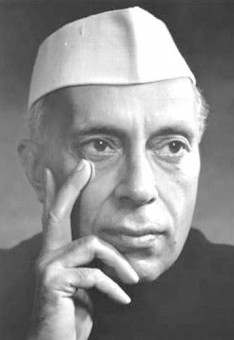

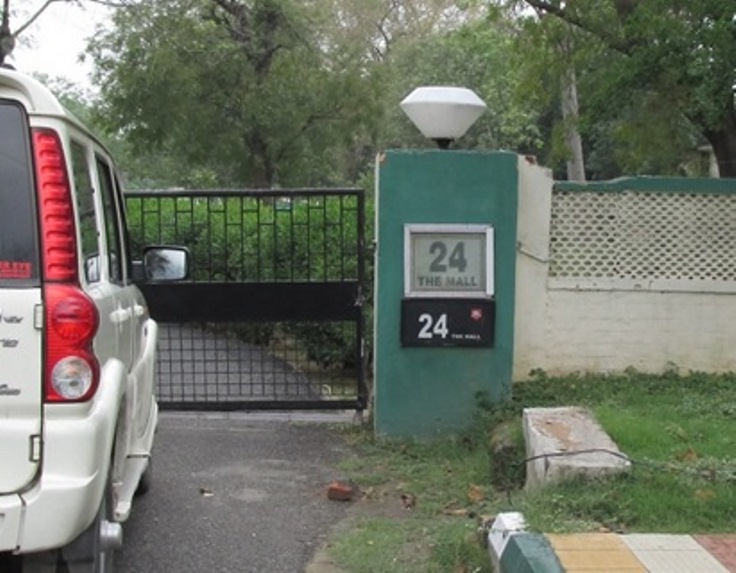
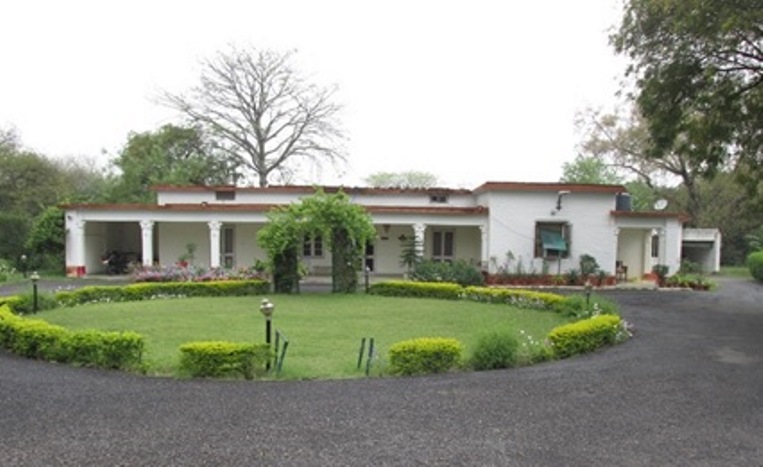
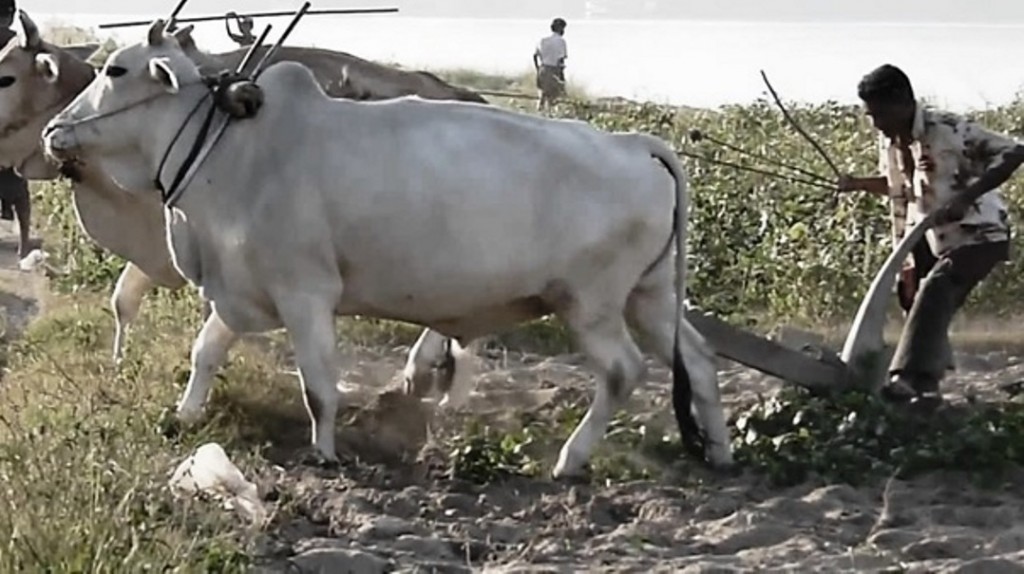
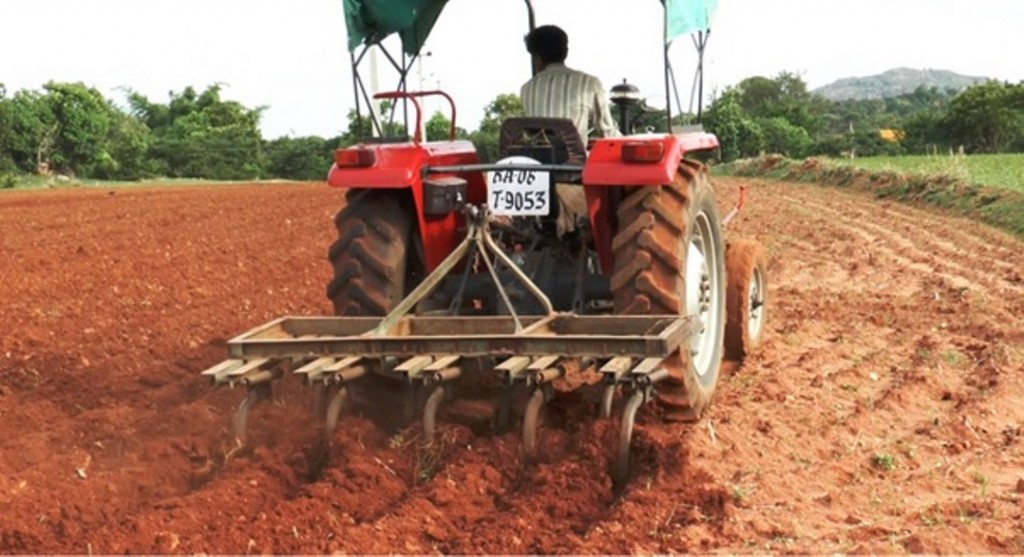
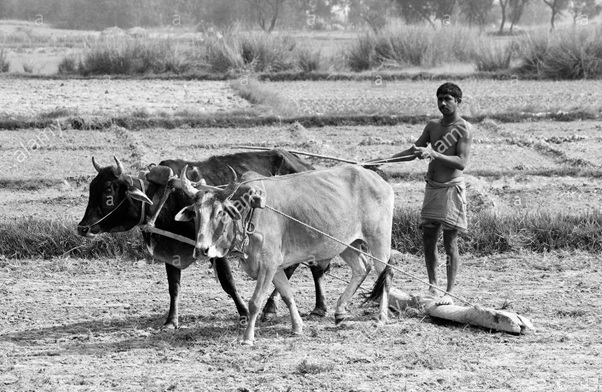
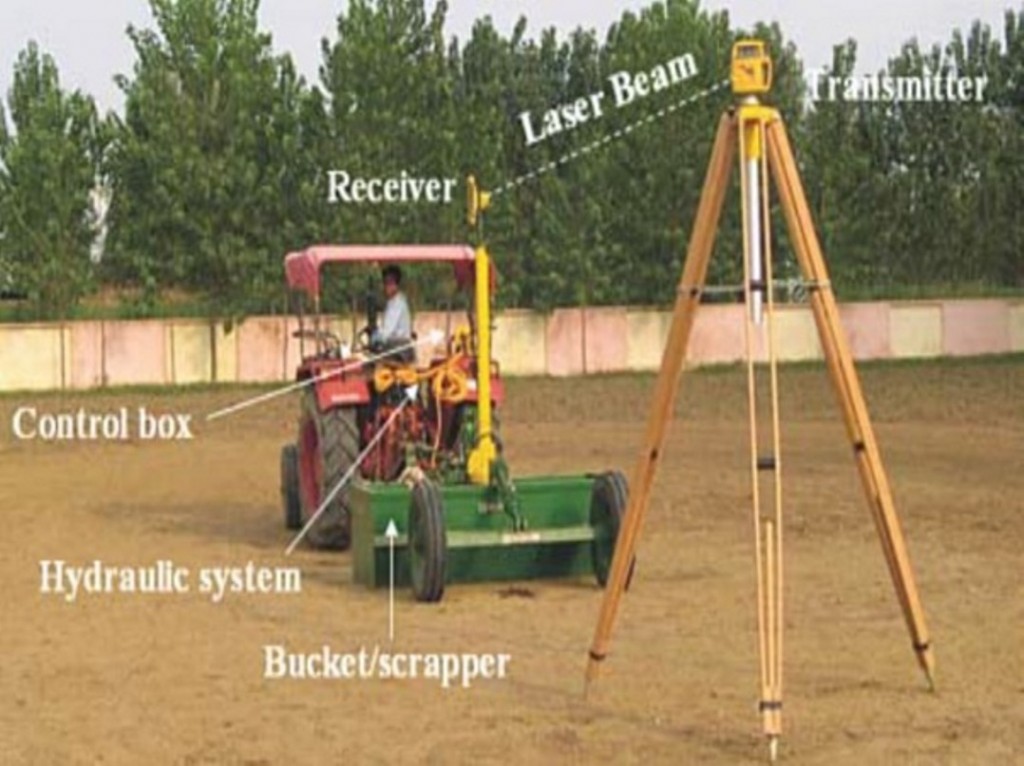
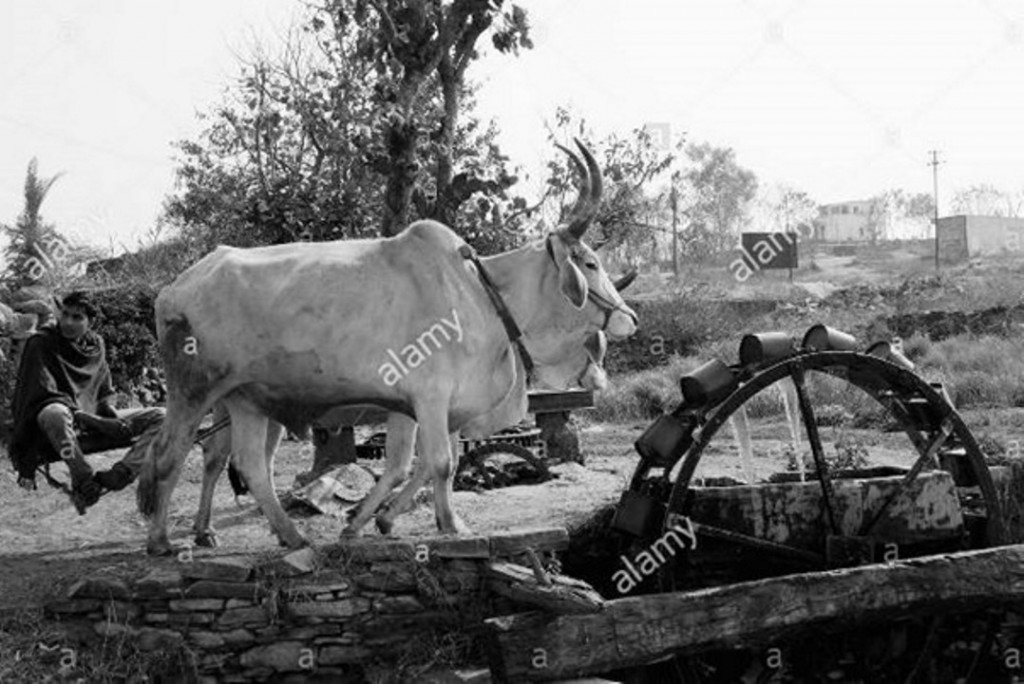

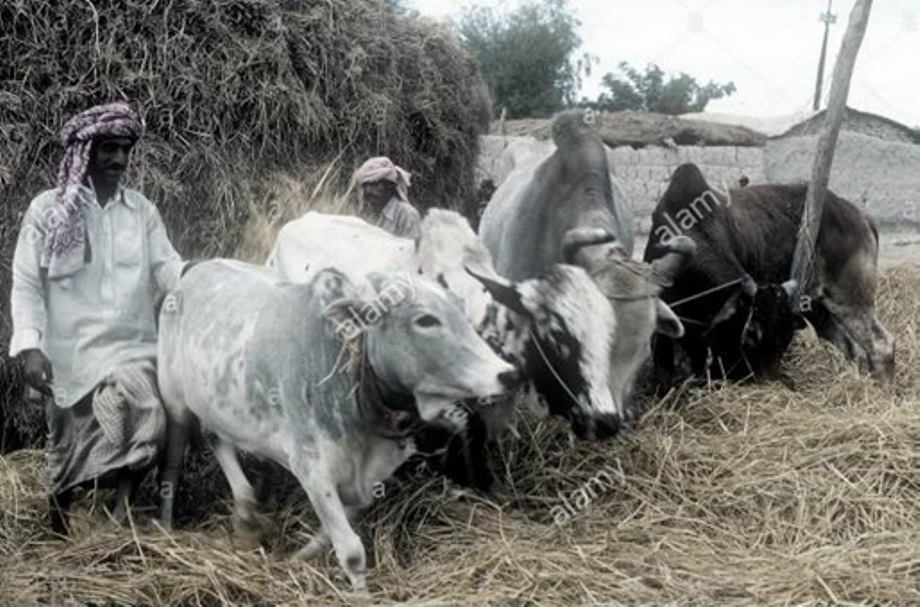
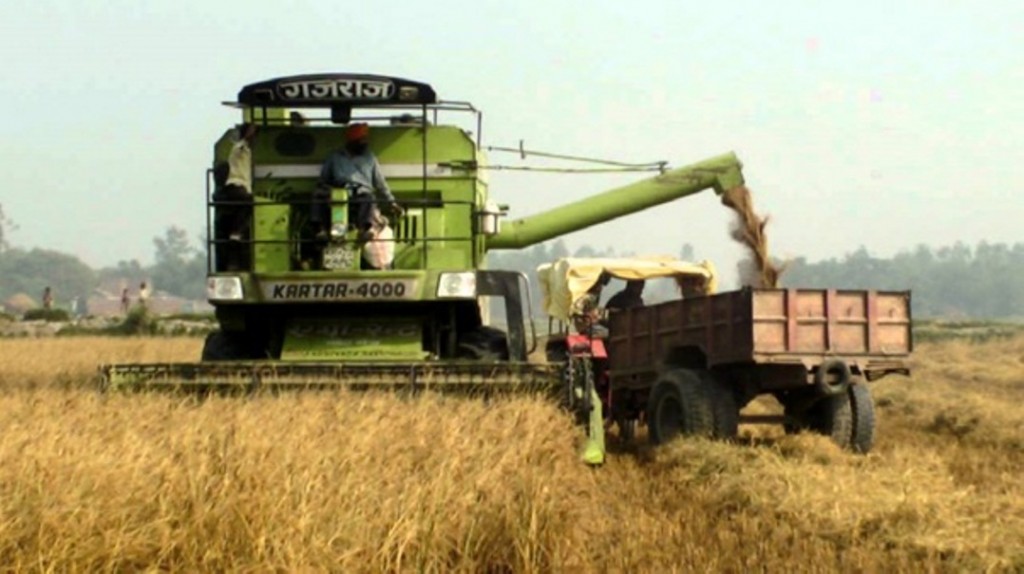
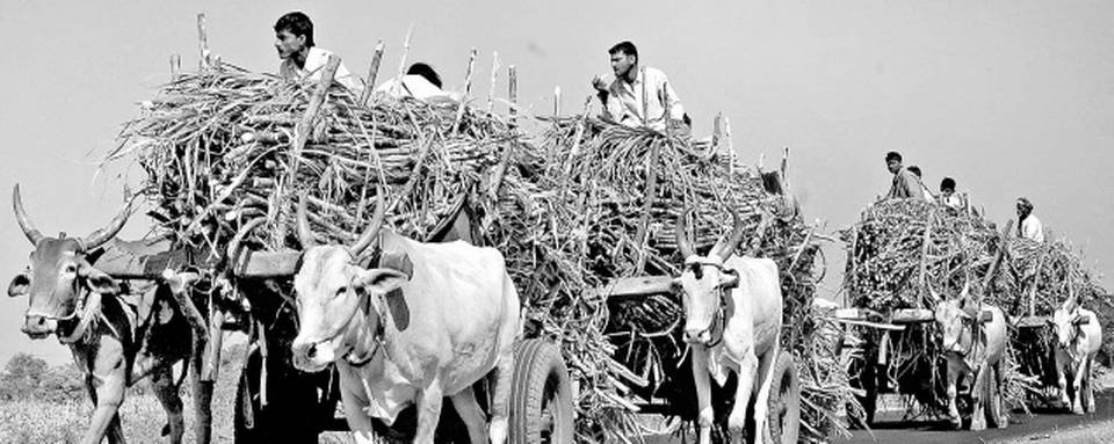
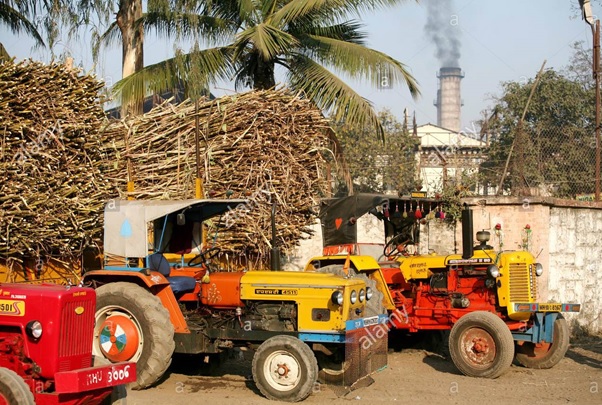
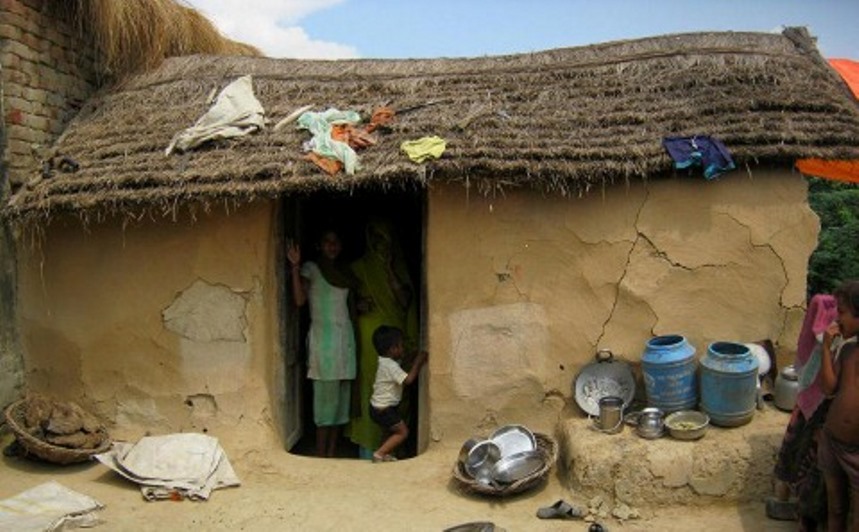



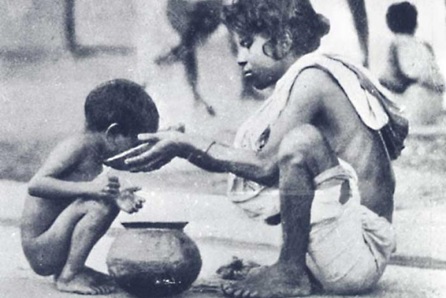
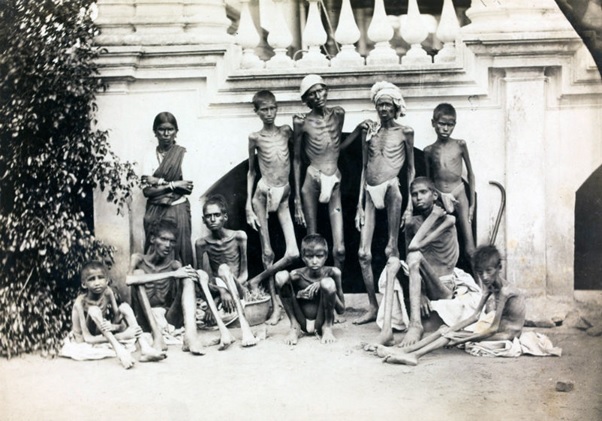
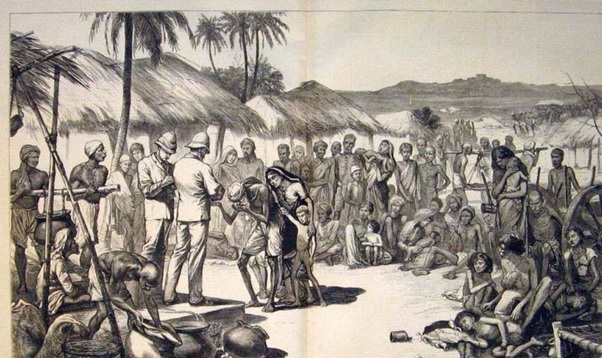




I enjoyed reading the piece, as usual, you put across profound thoughts through simple anecdotes. A sense of optimism and pragmatism was the hallmark of the revered old generation.
Rgds
Virin
Surjit, you are a genius. You have written exactly what we were brainwashed to believe. It was nonsense. We have seen it and as is normal in life, a generation can not imagine what changes time will bring in the next twenty years or so.
Sawhney
[3:26 PM, 4/30/2024] Ajai Chandele Gen: Good afternoon sir.
Decades have passed, but her face will remain etched in my memory forever. I have experienced her kindness and love for children as a 10-year-old.
[3:27 PM, 4/30/2024] Ajai Chandele Gen: Have you written anything on CI camp, Premnagar?
Would love to read sir
Ajai, Thanks. I am in the process of writing a full-length article, exclusively on life in CI Camp, where my schooling began in 1949. But upon going through my website, I found a piece entitled, “Perfectly Imperfect” which was inspired by the Tons river. Surinder joined me in writing it. The link to this piece is https://amolak.in/web/perfectly-imperfect/#comments. Do let me know what you think of it. I am also keen to do a piece on your parents, but for that you will have to give me inputs. Regards for Promil ji from both of us. Surjit
Sir, Excellent piece. A lot of research and plenty of background information.
Virin
Beautifully penned Uncle
The present lot of Modi lovers (and Nehru haters) would be too happy to spread this indication of their favourite anti-hero
Deepak
[7:17 PM, 4/29/2024] Ripi Singh: did not like the famine pictures at the end.
[7:18 PM, 4/29/2024] Ripi Singh: BTW – I met her a day before and she was at peace
Ripi
Surjit
Just got back from New Zealand on 27th settling down and getting over the jet lag. Just browsed the article will read it later Looks interesting What’s the news of the family?
Ravi
Sir,
Marvellous and well-penned-down homage.
Must admire the wisdom of your mother and the faith she had in the ability of Indians. Which conclusively proves that wisdom is not a slave of college degrees. Her thoughts are being echoed by the present ambassador of the US Garcetti in India where he is candid enough to admit that one has to be an Indian to be a CEO of a large company in the US. I feel Nehru and successive Governments in India never projected the correct picture of deaths due to Bengal Femine to people of the country. Famine was acute but most of the people died because Britishers never released the reserve stock food to overcome the shortage of grain and kept on sending it to the UK to feed its Armed Forces.
Surinder Bir
Amazingly singularity of wisdom exhibited by Jhai ji that is now showing up
You have a way of catching the attention of anyone with your choice of words gripping situation and lifetime experience narration
Remembering Jhai ji
One of the most pious ladies that I have heard of and met briefly
Her blessings upon the family from up above are always needed
OP
[7:57 PM, 4/29/2024] Rajinder Cell: Most befitting homage to the Noble soul. She had a very clear understanding of “What Is “.
Having her in my thoughts and emotions gives me an amazing feeling of peace.
Guru Rakha
[8:00 PM, 4/29/2024] Rajinder Cell: Thanks for sharing. Remembering Brother Surinder.
Great. Thank you for refreshing our memories of those lovely days spent in our youth. With regards & lots of love . Harbans
Thanks, with folded hands
Jog
Sir, thx for sharing..it was great reading the piece..
Ranjeeth
Thank you sir. Read and digested fully. The elderly had their wisdom. May Jhaiji have a continued restful repose in heaven.
Yes, I was lucky to sit next to the iconic Pt Nehru at lunch. Coming from the rural and poor India, I was like Jhaiji in my outlook if not in my prediction.
I need to record what transpired at lunch on 14 May 1961. I can still recall some.
Raj Kadyan
Very well written. Thank you for sending.
Amarjit
Beautiful article Sir. Very well written.
Your Jhaiji was prescient! The things she talked about, happened just the same way!!
Perhaps the educated overthink?
Two coincidences here.
One, my maternal grandmother was also called Jhaiji by us and the family.
Second. My father also came from Bhera in Sargodha District!!
Thank you and warm regards
Puneet
Yes ! She was such a wealth of peace & love ,literally
Savneet
Sat Sri Akal Chacha,
We are all fortunate to have them as our grandparents and blessed to have their blessings through our growing up years.
Missing all the good old days at –
Yamunanagar and
Bhadarpur
Sarni Chowk
Tube well
My regards and respects
Gulzar
Thanks Sir. The loving and reverential recount is in the book also you had graciously sent to us.
Only I wish you had not contrasted her views with JLN’s.
Certainly parents gave us birth and brought us up but the quality of life we have happened to receive owes much to the vision and wisdom of the founding fathers. JLN was the taller one amongst them.
Today life expectancy of 145 Cr is 70 while 33Cr had around the same life span in47.The socio -political state of baby India ought to be known to none better than us. I am unable to forget the luxury we all recived at the NDA from a poor nation.
Even on 62 wish the cross had not been put on him.Grossly unfair. It is us the Army leadership-bde to AHQ .JLN took the flak on himself.The truth is still hidden in the cl Henderson Brooks Report .That’s why it is not being made public even as parts of it are on the net.
Regards
Madan
Dear Dadu,
Reading your narrative “Pandit Nehru and our Jhaiji” was truly enlightening. The detailed description of Pandit Nehru’s birthday celebration made that historical moment come alive. Learning about your Jhaiji’s different viewpoints on population control and development challenged common beliefs and made me think about the wisdom passed down through your family.
Thank you for sharing this engaging story that combines personal experiences with important historical lessons.
-Aditi
Desr General Surjit,
First Sonu joins me in paying our respects to “Jhaiji”, the divine soul from our common ancestrage
Next, the socio economic Change that Bharat has undergone in last 70y, bears the contribution made by everyone concerned.
Jhaiji’s character and grit stands out from the fact that mothering team of sons, managing the household, husband, other sòcial and economic obligations.
The fondness with which you have narrated her presence and her impact on the environment around her can be discretely felt.
JLN did what he.felt.Right, we can always comment after the.event. Let us not forget he laid down the foundation of India today
Dear Veerji,
What an ode to Jhaiji! Your pen weaves stories which enter the heart and stay there for a long time. Your memories paint vivid images backed by real photos that mesmerise and take the reader to your world effortlessly. Thanks for sharing your wisdom and Jhaiji’s faith—both essential for leading a life of dharma.
Warm regards,
Neena
Using the memories of his beloved mother, Gen Surjit has penned a detailed narrative on Nehru’ s India with all its successes and failures and how cleverly Nehru was sold to the masses through deft propaganda.I still remember vividly his visit to our school first time alone and second time with Indira Gandhi.They failed to connect with the audience though the crowd would have lapped up anything spoken by Nehru. jhaiji presents a beautiful canvas through her son’ s memoir irrespective of Nehru or no Nehru
Sir
Excellent Memories.
Please send it for EME Journal.
Sorry for being late to reply.
jassal
Dear MSJ,
Thanks.
I am not sure that this will be suitable for the EME Journal. This theme belongs to a different genre.
Regards,
Surjit
My dear Surjit,
A very well written article: a pleasure to read as always for your writings. Jhaiji reminded me of my own mother who
also displayed a lot of rustic wisdom despite being just about literate like most ladies of that vintage. I think all this wisdom
was a result of the prevalent joint family system where ladies had to grapple with all types of problems and find workable
solutions acceptable to all the elders as well as questioning youngsters. They had worked with their own hands doing
myriad tasks 14-16 hours a day giving them expertise as also wisdom.
Kudos to all wise ladies of that era.
Regards,
Surendra
Dear brother,
Thanks.
It is widely acknowledged that education can only give knowledge. The teachers teach what they read in the books and books are written by people like us.
On the other hand wisdom is God-given. Some of the most famous people in the world had not received any formal schooling. At that not prevent them from achieving great heights.
I request you to write about your parents and share your experiences with our readers.
With best wishes for the family from all of us here
Surjit
Jhaiji immortalised – simply loved the article Sir. it’s a known fact that the simple villagers wit, wisdom and understanding of ground realities far exceed those who’ve learned in fancy schools – in most cases.
wish you’ll share more anecdotes from her’s and your life in coming days.
warmest regards,
HP
Dear Harman Preet,
I am glad to hear from you. This message has come after a very long time. Where are you now and what news of children?
Do look us up if you ever visit Chandigarh.
Surjit
Dear Sir,
I had read it and fwd to all my contacts.It is a brilliant piece as usual.It differentiate worldly wisdom from intellectual wisdom.
With warm regards,
Gangadharan
Dear Sir,
I read the piece but it is too short ! Having read the book on her ( which you very kindly gifted me during our stay in Chandimandir), this was brief. Request you to pick up few anecdotes from the book and put it up in this blog. My favourite was about the servant who decamped, after being shown total mercy by Jhaiji.
Nehru’s contribution can not be belittled , though I am not one of his admirers. Centralized planning, thrust on education and irrigation besides setting up a structured democracy with world class institutions including the constitution as a guideline and the Supreme Court to interpret it were his undoubted achievements.
Bengal famine was created by the British Government ( in UK) to deny grains to the likely advance of Japanese army, stockpiling at selected places (coupled with distribution to the privileged) and withdrawal of boats aggravated it. Besides this was occupation of Burma by the Japs , disrupting the supply chain, grain laden ships from Australia were diverted to build up stockpile for the isle of Britain by the express orders from Churchill. Indo American author Ms Madhurshree Mukherjee’s book ” Churchill’s Secret War ” is a seminal piece of work and describes in details how it was put into effect.
Prabal,
Thanks.
Great hearing from you after a long silence.
You are right about the Famine. Shashi Tharoor has been raising his voice on this issue at various forums. The Britsih Raj is to blame for several acts of omission and commission. During the War, the press and the politicians were busy with other issues…and Bengal was starving to death.
As for Jhai ji, I have been writing from time to time. I will put them altogether, someday. The piece you have recalled has already been posted. The link is given below:
http://amolak.in/web/our-mother-whom-we-called-jhaiji/
Do give me your latest phone number.
Surjit
Dear Surjit ji,
I an sorry for listing mite as might. I was wrong. I understood its meaning while reading a parable in the Bible. However. some more observations:
she used {to} pull the paper
total population [of vs if} the country.
Picture IV - to blow the [barn vs chaff] away
My last response went out by accident. I meant to click [Save] but hit send instead. I was still working on it. That is why there was no closing remarks.
With love,
Inderpal
Sir,
Did Nehru take all these decisions alone?
Was he not guided by his cabinet colleagues?
And India has a strong bureaucracy. In Nehru’s time, the ICS officers were not easy pushovers…
If all this is true, why single out Nehru for all the ills?
SJS Chawla
You have a point!
In 1952, the Congress had 364 out of 489 Lok Sabha seats. And after the demise of VB Patel, he had no real challenge within the Party. This picture remained unchanged in 1957 and 1962. Yet, Nehru was very democratic. He allowed his ministers a lot of freedom.
This can not be said about his successors.
Thanks for pointing out.
Surjit
Interesting reading.
More so, since I had ample opportunities to meet your respected mother while at Yamuna Nagar and earlier when your respected father was posted in Merrut and IMA.
Narinder,
Thanks.
The Sapra family was closest to ours…being from the same village in Pakistan.
Love, and regards.
Surjit
Dear Surjit ji,
Thanks for sharing with me the piece you wrote. I enjoyed it very much.
Noted some typos which I am listing below for consideration as your writings are archived for posterity.
mite vs might
cat vs cart
children are lining up in front –OF—the.
On Fact Check: You wrote that in 1943, you were nine years old.
This would put your present age at 84 !! Are you that old?
Wonderful mothers were & are still available around.
You are blessed that you had your own.
( Many may be feeling that she was also theirs )
Thanks for the post.
Dear Parkash,
You have said a lot in just one sentence!
Brevity is, indeed, the soul of wit…
Surjit
Thank you sir for Sharing past and present life. I find what ever may be the subject matter, you have the gift of gap to make it very interesting. Thank you for sharing. Regards.
Aulakh
Thank you.
Your words are like music to my ears !
Surjit
I remember our commissioning date 17 dec 1961. On that day, your dear mother played host to my parents.
My father was recovering from one month in coma aftet a road accident . Very gracious of your parents.
Surindar
Dear Surinder,
How can I forget that day!
Your family was very close to ours. I think, the association began long before the partition.
I also remember the days which we spent together in Meerut, preparing for the NDA examination. May God bless our parents!
Surjit
Well researched paper . I agree
with your comments that country
has progressed , but , it would have
done even better if population would
have been controlled .
Sadly our politicians are using this
increasing population as their vote bank .
It is still not too late to control the exploding
population .
With warm regards and best wishes .
ABS Sidhu
Indeed!
There no doubt that there is a crying need to control population. What the government was doing was right. There was a communication gap which got bridged when the levels of education improved.
Without a shadow of doubt, Nehru was very democratic. He had an overwhelming majority in the Lok Sabha and after the death of Sardar Patel, there was no real threat to his leadership. Yet, as compared to his successors he was less autocratic. I think that as compared to our neighbouring countries, we have done much better.
When deep record regards,
Surjit
Thanks for sharing.
thanks a great tribute to a reverend mother gagi
Great to hear from you!
Surjit
God Bless. Prey for eternal bliss and rest.
Dear Surjit Jee,
Thank you soo much for sharing wise thoughts of respected Jhai Ji. Being a fellow Sargodhian I understand
connotation of “Jhai Ji”!!
You are a genius, can express your thoughts and events in such an interesting manner. May God be with you.
Best wishes and regards.
Harbhajan Singh
Dear Vir ji,
Your words are like music to my ears!
I am glad to learn that you belong to the same part of West Punjab.
The creation of Pakistan has altered our lives. Our civilisation has gone with the wind!
Thank you ever so much.
Surjit
Enjoyed reading it Sir.Long live the sacred memories of beloved Jhaiji.
Warm regards
Hari
Thank you!
You were a great support to me in Sikkim. And now, your messages come like a breath of fresh air. Keep them coming!
With best wishes for Malathi from both of us,
Surjit
Dear General Surjit Singh,
I want you to know how much your tribute affected me.
I too remember being taken by my father for the so called Children’s day with Chacha Nehru. I recall him touching my head with numerous other children but kids are instinctive and I felt nothing.
Later in my father’s tenure in Delhi as the Director of Military Intelligence I also remember as a six year old being on the ramparts of the Rastrapathi Bhavan to see the Queen pass by. Unfortunately for my father, I told Krishna Menon when he came near us and was not dressed in a uniform I recognised, that I wanted him to bring me some more crayons to draw the Queen and he should do it ASAP. I in my young self had mistaken him for a clerk.
I recall my father later telling me that he was his boss. It seems my demand was repeated by the Defence minister to my father. I didn’t much care about it then.
I repeat this story only because at a very early age I was introduced to the people who ran this country but my instinct was not to be impressed.
Now after reading your story I realise the reason.
With warm regards,
Ashali
What an amazing story. It made me want to cry. So many ordinary but intuitively brilliant and a man who thought he knew it all!
A very nice tribute to your jhai ji, Surjit.
May I add …..
I read somewhere that in or around 1946, MK Gandhi advised Nehru to hand over the country’s prime ministership to Jinnah so that he would stop clamouring for the partition of the country. The egoistic Nehru refused to comply.
Towards the end of his term as PM, a very honest LB Shastri commented about JLN that all he was bothered about was to ensure that his daughter became PM after him.
After his death, his will wanted his ashes to be sprinkled on the Himalayas and all the rivers of India, as if India was his baap ki jaageer. What an egoistic person.
We lived in Amritsar in 1942 when thousands of ‘bhukka bangalis’ came over begging for food etc. There was a big famine in Bengal. I was 7 yrs old then and their plight touched me. Later on I learnt that the famine was man-made. It was caused by Churchill who took away all the foodgrains from Bengal for the war effort. That ‘hero’ was a rogue also.
Thanks and regards ……….. Cdr KK Punchhi
Bhai Sahib,
Thank you so much.
Like all Punjabis, I have been reading and hearing a lot of stories about partition. There is a great deal of haze on this subject. I suspect that we shall never know the truth.
Be that as it may, I think that the right thing is to move forward. The past is behind us. We can never go back, that is certain!
The great famine of Bengal is a tragedy which could have been averted. I think that the massacre of 1919 and the starvation in Bengal are two events which the British would like to forget. They should be grateful to the Almighty that during the last 70 years, there has been no repeat of such ghastly events
With regards and best wishes
Surjit
Good evening Surjit Sir,
Thank you for sharing with us insights about how your mother thought. She was so right.
Warm regards
Mohandas
Dear Mohandas,
Great to hear from you!
I am sure you are doing well. The Lord has given you an incredible store of energy!
God bless
Surjit
My dear General,
Thanks for sharing this nice piece—your dear & respected mother was certainly a great lady with tremendous knowledge at a time when life was very different to the modern age we live in now days.
My late uncle Yezdi Gundevia was a famous I.C.S. officer in those years & also close to Panditji— at the time & as kids we heard a lot of interesting stories from him.
God bless the kind soul of your dear mother.
With warm regards,
Zal Kabraji.
Dear Gen Surjit,
What a wonderful write up on your beloved Jhaiji! An excellent tribute to an exceptional lady with superb wisdom and vision.
We pray to the Almighty that her soul rests in peace!
Warm regards,
Ashok Chbibbar
Dear Ashok,
You are kind with your words!
Regards
Surjit
to me
Excellent article and tributes to your respected mother, Surjit
With Best Wishes and Warm Regards
Lt Gen J S Bhatnagar (Veteran)
PVSM, AVSM, VSM, COASM
MA, Msc, ndc, ldmc, psc, FIMA
Former Director General Supply & Transport
Former Honorary ADC to President of India
F-2697, Palam Vihar, Gurgaon-122017
Dear Course-mate,
Thanks.
Regards,
Surjit
Dear General,
Having the benefit of hindsight, the only thing that JLN did right was the IITs Act (1956 and 1961, this latter is at http://www.iitb.ac.in/sites/default/files/IITsAct_1.pdf, a remarkably clear document). His foreign policy, socialism, economic policy, military posture etc. were unmitigated disasters!
Warm regards
Sriram
Dear Sriram,
Thanks.
Great to hear from you.
How is Signion doing? And where are the children?
Do give us all the news.
Surjit
Very absorbing and poignant and so very well articulated.
Dear Raj,
Great to hear from you!
Where are you? I am told that you divide the time between India and the US.
Regards,
Surjit
If POPULATION IS CONTROLLED
then
where will Politicians go!!!!
I recall touching Jhaiji’s feet
twice
once when you brought her to my home
then a PALACE
turned to mud-like stone
AND
the last Time
on 30TH APRIL1997
you know
My respects to the most optimistic Lady of our era
but there is more to just optimism
we all know.
So let’s solve problems
sanely and alone
colls
Dear CSM,
East or West, your compliments are the best!
Surjit
Glad you smile and reply to as many as you can… I reply to all on daily basis.
I had composed a poem
”MY MOMS SMILES”
after about 50 years since her death—- she passed away on 22July 1968.I was barely then 28
On the Internet it is marching up
as my Best Poem ever
some have predicted that it may be
some day compared to FROST’S POEM
”ROAD NOT TAKEN”.
Today he is Number one poet ..Shakespeare is third Maya Angelou second
Knowing fully well that POETRY is not your cup of tea
but I see so many still read thee
May I post it here
as a tribute for Jhaiji ….
she was also like a mother to me.
let CSM me 4 ever b
Gen Surjit has paid tribute to Jhaiji, his revered mother, in the most exceptionable way by taking a leaf out from their lives highlighting the faith and trust that Jhaiji had in God and his kindness. She was lucky to have a son who paid well deserved tribute to her and also made us think of our respective mothers recalling our childhood days.
Gen Surjit has a knack of weaving the facts around into an interesting story which leaves the reader thinking about similar issues.
You are doing well Sir and keep at it so that others like us may be inspired to look at past events with nostalgia.
Dear Gen Coomar,
Thank you so very much. You are very kind with words.
Surjit
Jhaiji as we knew her was forever the optimist. As kids of the next generation we only saw her in her later years, that too for a few years.
The calm and quiet confidence she exuded rubbed off on all of us. And of course the optimism of always looking for the good in everything.
They don’t make them like them anymore!
Dear Deepak,
Thank you for your kind words.
I am of the opinion that you have very good command of the language. I remember the review which you wrote on my book many years ago.
Why not write something for our website?
With best wishes,
Surjit
Great people like JHAIJI will be remembered with love & adoration by all generations. Her thoughts mean a lot to the well-being of society. I appreciate how dear Surjit Bhai has put across the same as a true homage to his beloved mother. May all mothers have someone to glorify their lofty contributions.
Dear Basant,
How nice to hear from you!!!
I’m given to understand that you were a bit under the weather. But I’m told that you have recovered fully.
I invite you to write for our blog. It now reaches out to a very large number of friends.
When best wishes for your family from both of us.
Surjit
Dear Surjit Sir,
Yes, I had my own share of sickness, but now almost normal. Thanks for your concern.
Do you accept poems in your Blog? That is my area of interest.
Naveen joins me in conveying our regards to you both.
Basant
Who will dare not read such a beautiful and humane person Sir
like ye
With Love from Canada .
It was a great joy meeting you
Glad you speak well again
”Mere awaaz toe phir bhee subh sunlaetey hain
aap ke awwaaj kee tadap
dill meinn hai.
kaash hum bhee ”sunsakte” again!!!
colls
Dear Basant,
Yes, we do.
However, I find that most of the poems which we have hosted are in Urdu or Hindi. You may go through them by clicking on ‘Adab and adaab’ on the bill of fare of our home page.
I am again afflicted by back pain. I seek your advice.
Surjit
Sir, I have Respect and Regards for JHAIJI and their generation that had genuine faith in the LORD and what he did was for the good of HUMANITY. Wish I had the wisdom to have called on them,while at IMA.Well, past is past.
Yes, India has progressed and narration/ pictures indicate it well.
What I regreat is we as HUMAN Beings have travelled just in opposit direction. I donot know why, but feel most care only for self with minds to progress of community? Some one has said… the Westerners have taught us Science & technology, but at the cost of Oriental values and ethiks?
Enjoyed reading this .Long live the sacred memories of beloved Jhaiji.
Nehru bashing seems to be the flavour of the season. He was prime minister for 18 years. For the first 15 years or so, he was so popular that he could have become a dictator. We should be thankful that he preserved democracy in India.
It is also fashionable to blame Nehru alone for the setback in 1962. What about the rest of us ? In his book, Gen Palit admits that Army HQ knew that Dhola Post was beyond the Mac Line. They referred the issue to MEA who told them to go ahead and redraw the Mac Line unilaterally. What about the Directorate of Military Survey ? And the Survey of India ? What advice did they give ?
Agreed that Nehru’s record is mixed. But isn’t that the case with all of us ? None of us are right all the time. Only very few are wrong all the time.
Jhaiji exuded unquestioning optimism. I believe it was more of religious faith than anything else.
Much of the progress you have shown has been due to population control. My home district, Pathanamthitta, is the first district to have achieved Zero Population Growth (ZPG). Other districts have followed. These districts have achieved a standard of living comparable to developed countries. Contrast it with the backward districts in India. They have the greatest population growth.
Both Jhaiji and Nehru were right in their own ways.
J,
I think you are right. Both Jhaiji and Nehru were right.
The person who went wrong was a young lad called Surjit!
I think, I over-reacted. After having told the teachers and class mates, I should have kept my mouth shut. Trying to speak to the people in the servant quarters was not necessary. And where was the need to talk to Jhaiji?
Nehru did big things. So he made big mistakes. But he gave us a stable democracy. And he created the IITs!
Jhaiji’s role was restricted to looking after our father and bringing up four brats. She performed her duties very well, indeed.
Thanks for your help in this piece.
SS
Absorbing, interesting and poignant. Very well articulated.
Dear Tejinder,
Thank you. With best wishes for a Latha from both of us
I hope you will send us another story soon.
Regards,
Surjit
Thank you Sir. Haven’t written a story in a long time. I’ll mail a story written long ago which I have not shared already.
How are your sons and their families doing?
My son ARJUN is at Mumbai with his wife. My daughter is at UCB, CA and should complete her PhD in 2019. Latha is into voluntary work in a school and is enjoying it.
I continue teaching at a solar skill development Institute at Hyderabad (part time) and play (mediocre) Golf regularly.
How is Mrs Surjit doing?
With regards to both of you
Regards
Tejinder
MAY WAHEGURU BLESS THE GREAT SOUL WHO PASSED THIS WAY…..
Thank you, Sultan!
What use on your end?
Surjit